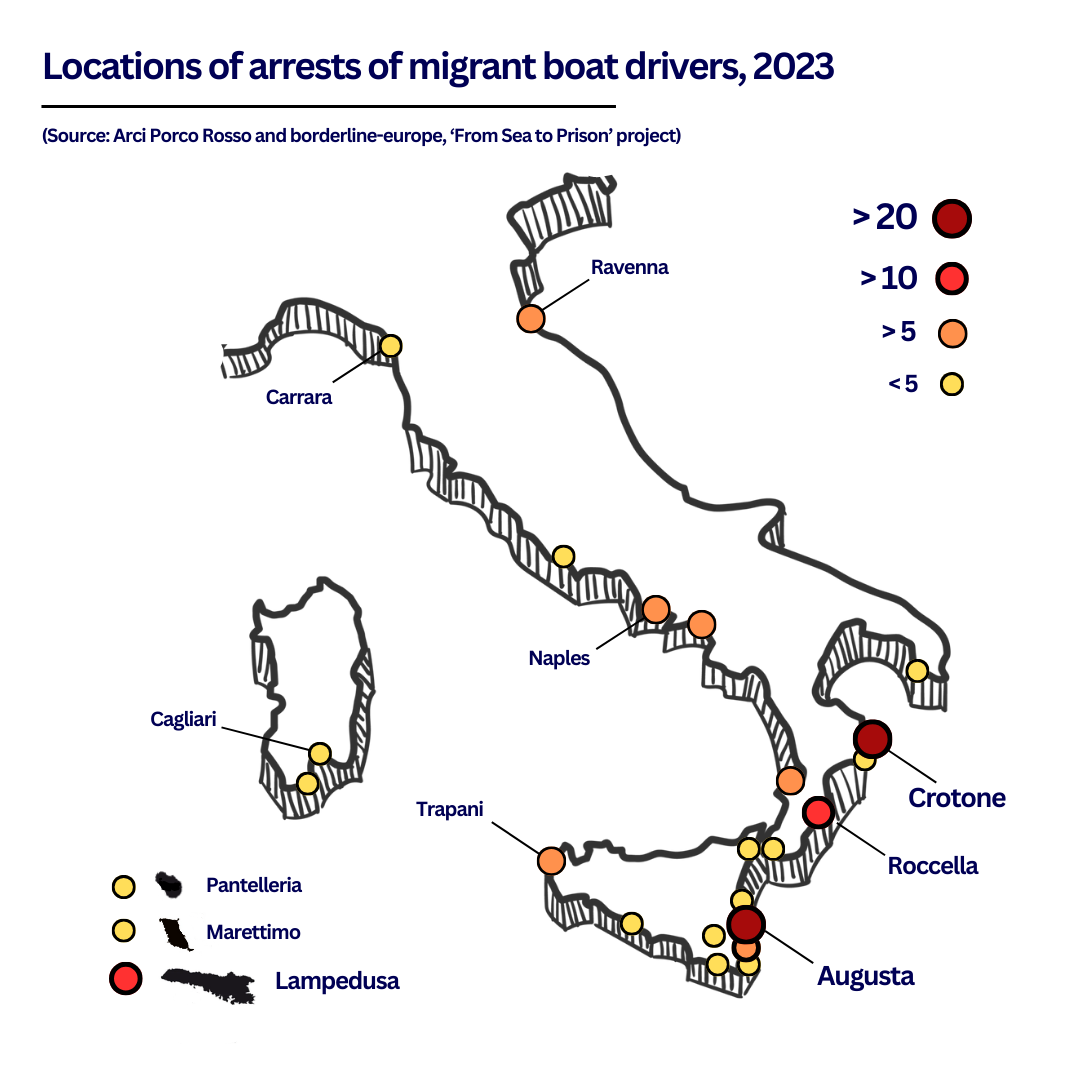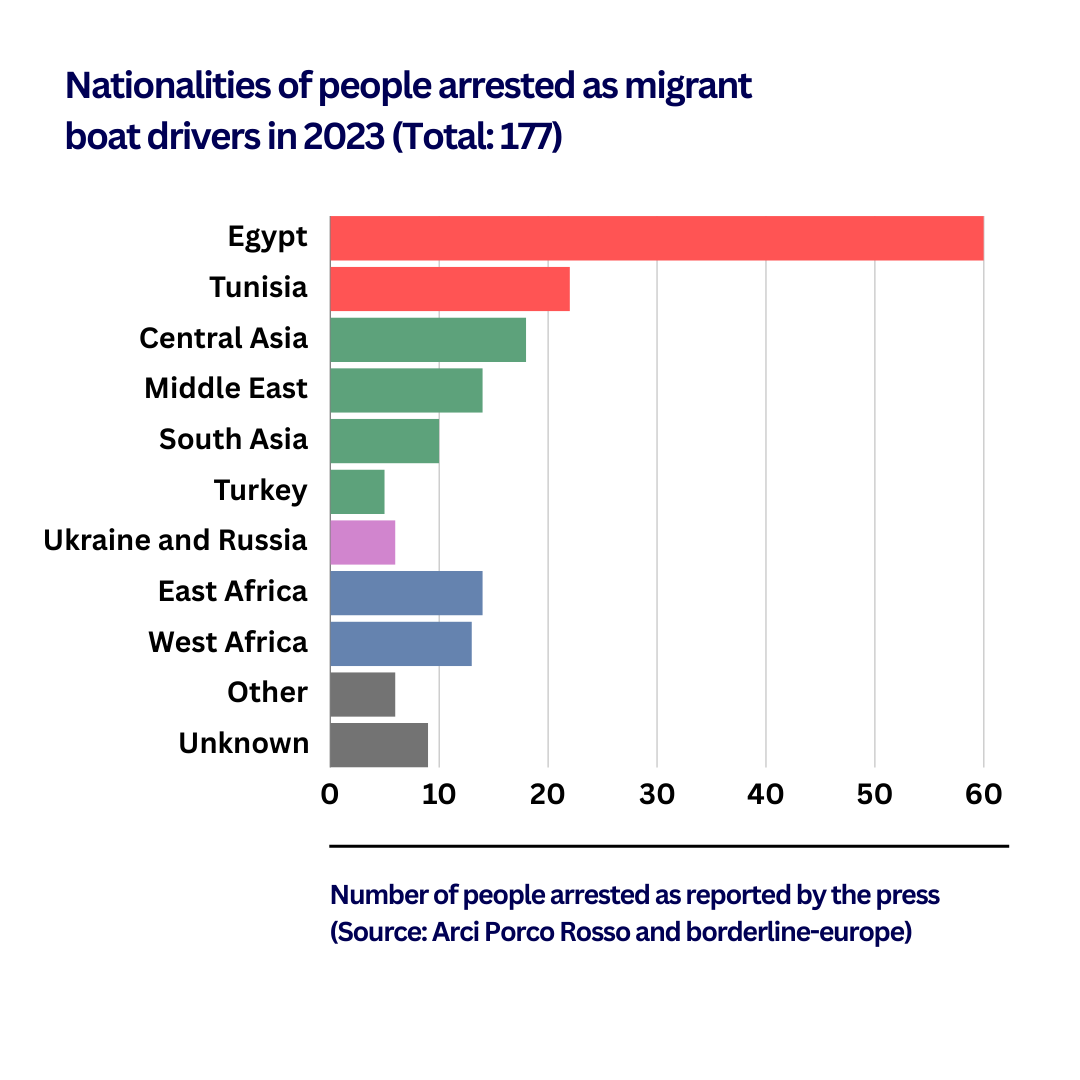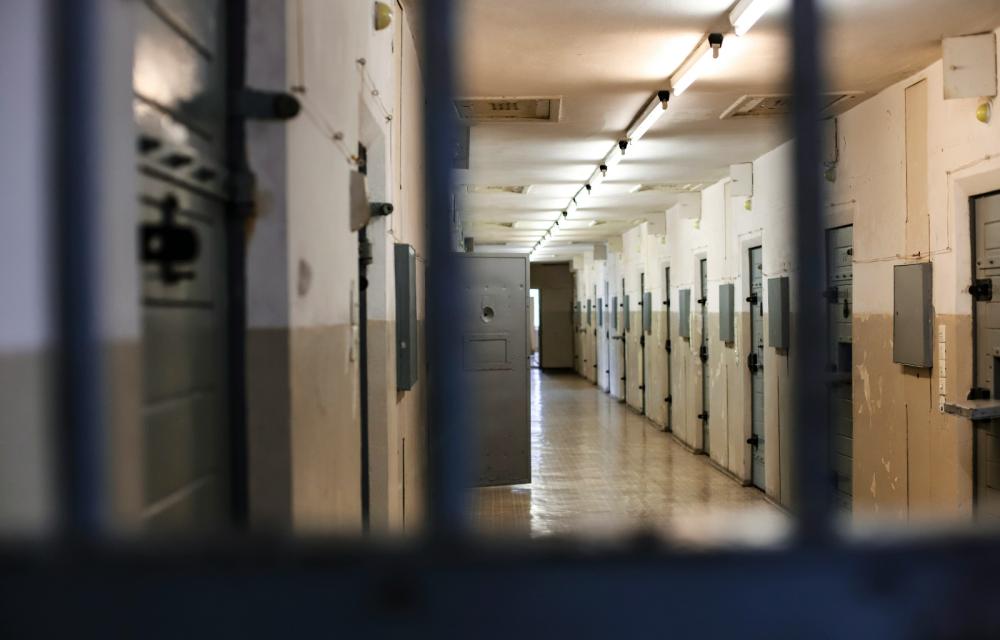Without Frontiers: The criminalization of migrant boat drivers in 2023.
From Sea to Prison, 4th quarterly report 2023 , from Arci Porco Rosso and borderline-europe
"It is possible for prison walls to disappear,
For the cell to become a distant land
Without frontiers."
- Mahmoud Darwish.
1. Data and news monitoring
Number of arrests
As in previous years, we systematically monitored the Italian local news over 2023 for arrests of people on the move accused of driving boats. We recorded 177 arrests over the last 12 months (in comparison with 171 noted arrests in 2021 and 261 in 2022). In a statement, the Italian Minister for the Interior claimed that “550 boat drivers” were arrested over 2022 and 2023. Given that back in April the Italian government boasted to have made 350 arrests over 2022 alone, we can estimate a total of 200 arrests in 2023. Since 2013, therefore, around 3,200 people have been arrested.
There are different possible explanations for this decrease. The most significant is an apparent shift in policy in Agrigento and Lampedusa, to not systematically arrest people at boat landings, focusing instead on specific cases that involve deaths at sea, torture, and – for the first time – accusations of piracy. Along with the organization Maldusa, we are following cases of people accused of piracy, and we have strong doubts about the appropriateness of the charge and the way in which these trials are being carried out; they , which seem to be taken as opportunities for juridical experimentation. It is also clear that the authorities in Agrigento continually arrest people (first and foremost Tunisian citizens) who have returned to Italy after having been previously deported, and are thus accused of the crime of breaking a ban on re-entrance. This is a clear manipulation of criminal law as a means to support Italy’s unjust policies of border closure and expulsion.
Locations of arrests and the Piantedosi Decree
Secondly, last year saw a new strategy in the Italian war on the NGO rescue missions at sea, which are now assigned ports across the country to slow down operations (as established by the Piantedosi Decree). A collateral effect of this, however, has been that often the locations to which the rescue ships have been sent are relatively new to such landings, and are thus unfamiliar with the policy of systematic criminalization that has been developed over the last decade. In ports in Northern Italy, sometimes arrests have been made but have then not been confirmed by local judges, even rejecting requests for pre-trial detention of the accused, given the weak evidence on which the accusations are often based. However, while in Agrigento and in some northern ports we can perhaps observe a certain resistance to the usual policy of systematically arresting boat drivers, the same cannot be said for other parts of Italy. In Eastern Sicily and Calabria a large number of people have been arrested and imprisoned: at least 28 and 11 arrests were made in the Sicilian ports of Augusta and Syracuse respectively, while the Calabrian ports of Crotone and Roccella saw at least 24 and 18. As can be seen from the map above, this tendency can be observed in ports across the same regions.
Nationality of arrestees
Over 2023, continuing the pattern of the last two years, the authorities particularly targeted Egyptian citizens, identifying at least 60 as boat drivers. This is a very different trend from the years immediately prior to 2020, when Egyptians had stopped being the main criminalized nationality. Since this tendency reversed in 2020, around 300 Egyptians were arrested, the majority of whom are probably still in Italian prisons. A significant change in the nationalities of arrestees over 2023, however, can be seen in the notable increase in the criminalization of migrants the Middle East, Central Asia, amounting to c. 40 people arrested this year.
In terms of the route across the Ionian Sea, generally departing from Turkey and arriving to the southern Italian region of Calabria – the same route taken by the boat that sank near Cutro one year ago – in 2021 the majority of people arrested as boat captains came from Russia and Ukraine. With the commencement of the war, far fewer people with these nationalities have arrived, while we saw an alarming increase in the prosecution of Turkish citizens over 2022. This year, on the other hand, we have noted very few arrests of people from either Eastern Europe or Turkey, and instead many more people from Central Asian countries.
It should be noted that the decrease in arrests carried out in Agrigento can also be read in the light of large-scale operations against smugglers in Sfax by the Tunisian police, with European political and economic incentives. The Italian and Tunisian governments have boasted about 750 arrests carried out in Tunisia over the last 3 months, as well as violent strategies of interception and refoulement, as both Amnesty and the Tunisian Forum for Social and Economic Rights have publicly criticized. A harshening of laws against smugglers in Egypt has similarly led to wide-spread arrests and unfair trials. For example, on 11 June 2023 a campaign of unjustified arrests for smuggling in the city of Marsa Matruh led to the death of an Egyptian citizen in a police shooting, as condemned by the Refugees Platform in Egypt. At the same time, the EU has refined their own legal tools, increasing the infrastructure for border control and criminalization, also by proposing amendments to the Facilitators Package, such as those presented at the launch of the new ‘Global Alliance Against People Smugglers.’
It should be entirely clear then that, while we can celebrate some limited victories, people smugglers and boat drivers remain the scapegoat par excellence in Europe and beyond.
2. One year in hearings and casework
We are currently monitoring the situation of 107 people accused of boat driving, 66 of whom are currently in prison. Of those detained, 32 are in Sicily and 16 in Calabria; the remainder are in different prisons across Italy. As one might expect from the arrests over recent years, nearly half of the prisoners we are in touch with are from countries in North Africa (30 out of 44), whereas the majority of criminalized people from West Africa that we know have by now been released (23 out of 30). We are also in touch with 24 people coming from a range of Asian countries (including Turkey, Palestine and former Soviet countries), most of whom are still detained.
Cutro
It’s been nearly a year since almost 100 people have lost their lives on the shores of Cutro, in Calabria. As well as crocodile tears and a new racist law, the Italian government also reacted by enacting the usual spectacular trial against the alleged boat drivers.
Working alongside activists in Calabria, we are closely following the trials against Khalid, Hassab (from Pakistan) and Sami and Gun (from Turkey), survivors of the shipwreck who now have to defend themselves against the Ministry of Interior, the national Government and the regional government of Calabria, who have all intervened as plaintiffs. These governmental bodies are seeking compensation for over one million Euros for the damages to the country’s image and tourism sector: as if this were the real tragedy of the massacre.
Trials
We have followed a range of criminal proceedings over the past year, offering our support to both criminalized people and their lawyers; in some cases we attended hearings in person.
- Among the victories we have witnessed, we cannot but mention the recent acquittal of Ali Fabureh by the Appeal Court in Messina, a young Gambian man who had been wrongly sentenced to 10 years by the court of Messina.. We also saw another significant victory in Messina: the sentence of not guilty in relation to a proceeding that began two years ago, when four people were accused of driving a fishing vessel with hundreds of people on board – and were also deemed responsible for the death of five of the passengers. The acquitted include A., currently hosted by Baobab Experience in Rome, and with whom we are still in touch. We saw another important victory in Palermo back in February, with the acquittal of 10 people who had been accused of facilitation. The court recognized the ‘state of necessity’ created by the violence to which the accused had been subjected in Libya, a sentence that we hope will open the way for more judgments that recognize this argument. The sentence is now non-appealable.
- Unfortunately, not all the trials we’ve monitored have come to a positive end, proof that although there have been some steps in the right direction, there is still much to be done. For example, often trials against two defendants in the same proceedings can have different outcomes. This is the case in a proceeding against two Senegalese citizens in the Court of Agrigento which, even while dismissing the case against one of the accused, is keeping the other on trial.
- On other occasions, trials end in convictions without any related exonerations. This was the case of the deplorable sentence of 7 years’ imprisonment handed down by the Court of Locri on Ahmid Jawad, an Afghan magistrate who is still fighting to show that he was a mere passenger on the boat that transported him from Turkey to Italy..This is also the situation for Ahmed, whose appeal against the conviction inflicted by the Court of Agrigento was rejected by Palermo’s Appeal Court.
- Finally, we want to express our indignation and concern over cases such as that of E. (from Egypt) at the Court of Locri, or that of M. and J. (from Sierra Leone) at the Court of Reggio Calabria, with whom we are in touch, all of whom have been accused of the new crime of ‘Art. 12 bis’ of the Italian Immigration Act, which was introduced by the ‘Cutro decree’, and which sets even higher penalties. We are following their trial at a distance; in January, the Court of Locri rejected the request of referral to the Constitutional Court which had been presented by the defense lawyers to contest the legitimacy of the new crime.
Deportation centers (CPRs)
The problems faced by people criminalized for boat driving do not end with their release from prison, as we have explained in previous reports. This year we followed several cases of people who were taken directly to detention centers, with very different outcomes. We are happy to report that the last two cases of the year had a positive conclusion. In December, a Ukranian woman and a Tunisian man, both of whom had been convicted of facilitation, were released from the prisons in Palermo and Caltagirone respectively and not taken to a deportation center. In the first case no doubt the person’s Ukrainian nationality played an important part, whereas in the second case it is important to note that the deportation centers are currently so overcrowded there was probably simply no space. Regrettably, it has not always been possible for people to avoid detention and even deportation. In some instances even when people have applied for asylum, they can nevertheless be taken to deportation centers; some people we have been in contact with stayed for a few days, others for months. Due in most instances simply to luck,, in the end most were able to leave the centers and, even though they have little chance of obtaining documents in Italy, can now live in Italy ‘in freedom’.
Unfortunately, things ended very differently for two people we were trying to support. The bureaucratic machine demonstrated all its cruelty, deporting them before they were even able to access more substantial support. Today they are in Gambia and Egypt. The latter case is particularly concerning given that the person in question was actually acquitted by the Court of Messina; despite this, deportation awaited him at his exit from prison.
Access to house arrest and forms of parole
This year has been particularly significant in terms of overcoming the legal obstacle to house arrest and parole which – according to t. Article 4bis of the Italian prison code – applies to people criminalized for facilitating border crossing. Indeed, we followed our first cases of people sentenced for facilitation accessing forms of house arrest. One such case was that of ‘B.’, who was released to house arrest, and spent the last months of his sentence near Sciacca. Now that he is free, he has settled in the town and achieved some of his personal goals: he has a job and a social network. This is also the case for A. and O., who have accessed house arrest after sentencing thanks to the social housing project “Un Nuovo Giorno” in Palermo. We are still, however, waiting for the result of the same request for B’s cousin, for whom we have been trying to organize house arrest since 2022. We hope he will soon be able to see the sky beyond the prison walls.
We also followed the cases of 6 people (including the 3 Palestinian defendants who were on hunger strike last summer) who have been able to access house arrest while awaiting trial. Although during pre-trial detention the legal obstacles to parole do not apply, house arrest is still notoriously difficult to obtain in these cases. These success stories have only been possible thanks to the defense lawyers’ repeated attempts, as well as the increasing openness of a small number of social projects and spaces. It’s great to see when someone manages to squeeze through the cracks in the system – and we will keep working to widen these cracks, even while being well aware that this tool can only relieve the suffering of a few people, and in any case cannot hope to rectify the damage done by their detention.
3. Network
All of our work is only possible thanks to a range of strong, committed, and well-informed networks. Over 2023 we had the pleasure of collaborating with different initiatives, groups and networks from Turin to Naples, from Lampedusa to London, from Rome to Brussels and New York.
Among the many initiatives proposed in our networks we want to highlight the Free #Pylos 9 campaign, promoted by the Captain Support for the people arrested after the Pylos massacre in Greece. We have also had the opportunity to meet other solidarity groups in Brussels, such as PICUM, who organized a conference at the end of November on the links between criminalization and migration control. This collaboration also led to a conversation around the new “Global Alliance to Counter Migrant Smuggling” which was coincidentally launched in the same days.
We participated in a conference on Global Perspectives on the Criminalization of Migration organized at the University of Columbia in New York, and we presented our work at the Woodbine social center along with other local groups engaged in border struggles.
Here in Italy, if on the one hand the Piantedosi Decree has tried to hinder NGO rescue ships by forcing them to disembark in different Italian ports (as we said in the previous paragraphs), on the other it has helped catalyze solidarity movements’ awareness of arrests at disembarkation in different cities. Thanks to the work of supportive lawyers and activists in Naples, and with the support of the Legal Clinic at the University of Roma 3, people who were arrested at disembarkation in the region of Campania have had access to independent, well-rounded support.
Finally, in December we attended an event organized by the Rome-based association Baobab Experience, “Capitani Coraggiosi”, to which we were invited along with other groups active in campaigning against criminalization of boat drivers. After the screening of the critically acclaimed movie “Me Captain” (now officially in line for an Oscar), and a conversation with the director Matteo Garrone, the event launched a campaign in support of Alaji Diouf, a young Gambian man who was detained in Italy for 7 years for facilitation. Alaji is now free, and is asking for his case to be reopened so that he can seek justice. As he stated in his speech after the movie: “Everything that happens after, that’s where the story truly begins. [...] Now that I’m free I want the world to know the truth.”
A project by Arci Porco Rosso and borderline-europe
An Arabic version of the text can be found here (in collaboration with "Refugees Platform in Egypt")
We would like to thank Iuventa Crew, Sea-Watch Legal Aid and the Safe Passage Fund for supporting our work in 2023. If you would also like to support our work, please contribute to Arci Porco Rosso’s fundraising campaign!



